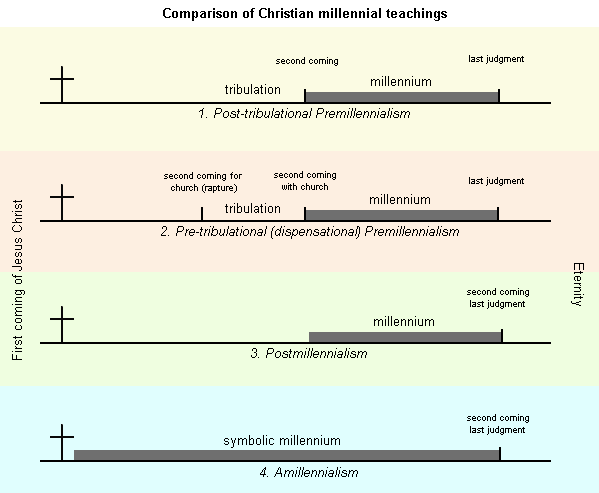Difference between revisions of "Book of Revelation"
m (Fixed the broken link) (Tag: 2017 source edit) |
|||
| (7 intermediate revisions by 4 users not shown) | |||
| Line 33: | Line 33: | ||
The Book of Revelation is the final book of the [[New Testament]] in the [[Bible]]. It is composed of apocalyptic literature. | The Book of Revelation is the final book of the [[New Testament]] in the [[Bible]]. It is composed of apocalyptic literature. | ||
| + | ---- | ||
| + | |||
| + | '''Read [[Matthew Henry's Concise Bible Commentary]] on [[Text:MHC Concise {{SUBPAGENAME}}|{{SUBPAGENAME}}]]''' | ||
| + | |||
| + | ---- | ||
| + | |||
| + | ==Authorship== | ||
| + | |||
| + | The Book of Revelation is sometimes called the "Apocalypse of John" to distinguish it from [[Apocalypse of Peter]]. As the name suggests, the author is named 'John' and is traditionally attributed to [[Apostle John|John the Apostle]] when he was in exile on the island of Patmos. It was most likely written in 95 or 96 AD just a few years before John's death. | ||
===Interpreting Revelation=== | ===Interpreting Revelation=== | ||
| Line 61: | Line 70: | ||
[[Category:Books of the New Testament]] | [[Category:Books of the New Testament]] | ||
| + | [[Category:Christian doctrine and debates]] | ||
[[Category:Commentary]] | [[Category:Commentary]] | ||
Latest revision as of 22:44, 9 December 2023
| Revelation | |
| RELATED TOPICS | |
| SERMONS, ESSAYS AND OPINIONS |
|
| CONTENTS | |
Chapters
1 2 3 4 5 6 7 8 9 10 11 12 13 14 15 16 17 18 19 20 21 22
Commentary
The Book of Revelation is the final book of the New Testament in the Bible. It is composed of apocalyptic literature.
Read Matthew Henry's Concise Bible Commentary on Book of Revelation
Authorship
The Book of Revelation is sometimes called the "Apocalypse of John" to distinguish it from Apocalypse of Peter. As the name suggests, the author is named 'John' and is traditionally attributed to John the Apostle when he was in exile on the island of Patmos. It was most likely written in 95 or 96 AD just a few years before John's death.
Interpreting Revelation
There are wide variety of views and interpretations of Revelation.
The following 4 main approaches are generally used (and combinations thereof)
- Symbolic Idealism
- Futurist - The visions relate entirely to the future
- Historicist - The visions show a progressive forecast in history, including past events, current events and future events
- Preterist (Contemporary History) - The visions relate entirely to events that were occurring 1,900 years ago when text was written
One of the major themes of Revelation is the "End Times", with mention of the "Millenium" in a number of places. There are a wide variety of views including (partly related to the above main approaches to interpreting the book)
- Premillennialism - Jesus returns prior to the Millenium (usually a futurist view)
- Postmillennialism - Jesus returns following the Millenium (usually a historicist view)
- Amillennialism - The Millenium is the symbol of this current age (usually a symbolic, historicist approach)
- "Panmillennialism" - The view that says: "It will all pan out in the end, even if we don't know how"
This article is a stub. You can help WikiChristian by expanding it. For help please read the WikiChristian Tutorial and our writing guide.
Quotes
Links
Return to Bible -> New Testament
